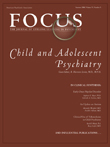Ask the Expert: Children in Adult Mental Health Treatment
Your adult patient begins a treatment session for depression with a discussion about her 9-year-old daughter. She says that she is worried about her child and also worried about the effect that her depression is having on her daughter. She asks for your advice. What do you do?
Parenting is a major focus in the lives of many of our patients. Effectiveness as a parent and a mutually supportive relationship with one's child are major sources of satisfaction and resiliency. Recognizing one's competence as a parent can have a major therapeutic impact on patients. Conversely the experience of ineffectiveness in parenting and a conflictual or disconnected relationship with one's child can be a cause for distress and can impede mental health treatment. Frustration, helplessness, and the experience of being overwhelmed by parenting responsibilities often coexist with and reinforce mental health problems. The challenge for the adult psychiatrist is to recognize which situations warrant continued discussion with one's adult patient, which warrant evaluation of the child by a child and adolescent psychiatrist, and which warrant exploration by a therapist trained in family therapy and knowledgeable about the impact of parent-child interactions on child development. Because of the role of parental psychopathology as a risk factor for poor development, the possibility that the child may be genetically at risk for mental health problems and because of the positive developmental impact of early recognition and treatment of child mental health problems, these decisions are important and timely.
Unique dilemmas often complicate the psychiatrist's exploration of this patient's parenting and his or her understanding of the child. The psychiatrist will need to ask questions about these issues in a delicate fashion to ensure a continued alliance with his or her patient and to help the patient view a referral as helpful and potentially valuable and not as critical or rejecting. If the child being discussed by the patient is in treatment with a mental health professional, the psychiatrist should request the patient's permission and speak with this professional so that they are working in concert.
It may be best, except in emergency situations, that the psychiatrist gradually develop an impression of the child and of parenting through sensitive questioning and attentive monitoring. The psychiatrist must keep in mind that he or she is a mandated reporter of situations that raise suspicion of child abuse or neglect. The psychiatrist should also be aware that he or she is appreciating only one perspective of the child and parenting from his or her patient and recognize that other perspectives might be obtained from the patient's parenting partner, from a divorced or separated coparent, from extended family, or from the child.
As the psychiatrist listens to the patient, he or she will develop a picture of the child's life, paying attention to growth, development, sleep, and appetite, learning about the child's functioning at home, at school and with peers, discerning how the child responds to affection, frustration, and limits and identifying the child's capacity for goal-directed activity and for emotion regulation. Warning signs include poor function, poor affect regulation, sleep problems, chronic lack of motivation, difficulty regulating attention and activity, and problems with eating, substances, sexuality, and the legal system. Generally concerns about these issues warrant referral and evaluation by a child and adolescent psychiatrist. Poor school performance may require an educational evaluation by the child's school.
Parenting can be conceptualized as including behaviors that are nurturing and caring; structuring (ensuring safety) and supervising, those behaviors that indicate the parent cares about the child as he or she is and demonstrate that the parent can experience, label, and support the child's emotions. As the patient talks about her parenting behaviors, the psychiatrist can reinforce those that represent effective parenting. Family therapy can be suggested to deal with situations that sound chronic, unproductive, or unchanging. The psychiatrist can decide in any situation to include other family members in sessions but this decision must be carefully considered and carried out with skill.
One common challenging situation occurs when the psychiatrist is treating a separated or divorced parent involved in significant postseparation conflict involving and negatively affecting the child. At times the patient may be expressing frustration about the situation that the psychiatrist will hear and understand, but if the situation continues to be highly conflictual, the psychiatrist should firmly recommend that his or her patient engage the other parent in postdivorce couples therapy. Similarly if the psychiatrist hears of marital conflict, especially conflict involving the child, couples therapy may be necessary. Another situation that can be difficult is that when the psychiatrist's patient is an overburdened, isolated single parent. In this situation, encouraging the patient to engage in social support and enlist baby-sitting help or respite from neighborhood friends or extended family can be very helpful.
Listening to patient's concerns about her children with sensitivity requires patience, clinical skill, and awareness that a significant problem in the patient's life may underlie the concern raised in the session. The psychiatrist will need to know and be able to collaborate with effective and competent marital and family therapists and child and adolescent psychiatrists in the community. The psychiatrist's treatment of his or her patient will benefit from attention to parenting- and child-focused concerns. The patient will benefit from her enhanced effectiveness as a parent and from the satisfaction of a loving relationship with her child.



